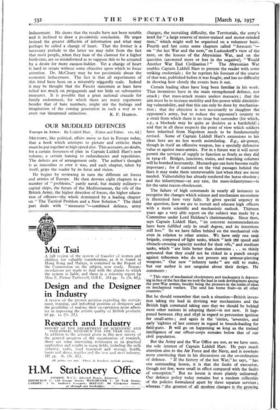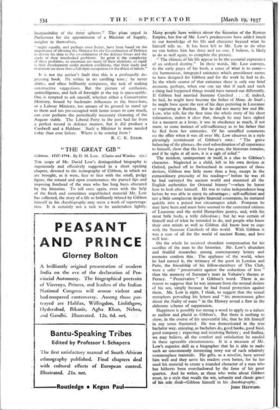OUR MUDDLED DEFENCES
Europe in Arms. By Liddell Hart. (Faber and Faber. 12S. 6d.)
MILITARY, like political, affairs move so fast in Europe today, that a book which attempts to picture and criticise them must be put together at high speed also. This accounts, no doubt, for a certain looseness of plan in Captain Liddell Hart's new volume, a certain leaning to redundancies and repetitions. The defects are of arrangement only. The author's thought is as masculine as ever it was, and each chapter, taken by itself, grips the reader by its force and vision.
He begins by reviewing in turn the different air forces and armies of Europe. He then devotes eight chapters to a number of "problems," partly naval, but mainly military— capital ships, the future of the Mediterranean, the role of the British Army, the higher direction of forces, the higher educa- tion of officers—the whole dominated by a leading chapter on "The Tactical Problem and a New Solution." The third part deals with "measures "—combined defence, army changes, the recruiting difficulty, the Territorials, the army's need tor." a large reserve:of motor-trained and motor-minded men," which might well be organised on a volunteer basis. Fourth and last come some chapters called "forecasts "- on "the last War and the next," on Ludendorff's view of the next, on the lessons of the Abyssinian War, and on the question (answered more or less in the negative), " Would Another War End Civilisation?" The Abyssinian War enables Captain Liddell Hart to present the reader with some striking credentials ; for he reprints his forecast of the course of that war, published before it was fought, and has no difficulty in showing how closely the events bore it out.
Certain leading ideas have long been familiar in his work. That inventions have in the main strengthened defence, not attack ; that mass-attack means useless massacre ; that the aim must be to increase mobility and fire-power while diminish- ing vulnerability, and that this can only be done by mechanisa- tion ; that the objective is not necestarily to slaughter the opponent's army, but to reduce the opponent's country to a strait from which there is no issue but surrender (for which, e.g., a blockade may be- quite as decisive as a battlefield) ; and that in all these respects the point of view which soldiers have inherited from Napoleon needs to be fundamentally revised. -Some of Captain Liddell Hart's extensions to his ideas here are no less worth assimilating. E.g., air-power, though in itself an offensive weapon, has a specially defensive value as against mass-armies. For in a future war it will never permit the services of supply to function as freely. as they did in 1914-18. Bridges, junctions, trains, and marching columns will be bombed incessantly. Mustard-gas can here become really important ; for if scattered on the vital passages behind the lines it may make them tmtraversable just when they are most needed. Vulnerability has already rendered the horse obsolete ; and the infantryman—at any rate, the mass-infantryman—is for the same reason obsolescent.
The failure of high commands in nearly all instances to recognise the changes which Science and mechanism necessitate is illustrated here very 'fully. -It gives special urgency tis the question, how we are to recruit and educate high officers with a more scientific and mechanistic outlook. Thirteen years ago a very able report on the subject was made by a Committee under Lord Haldane's chairmanship. Since then, says Captain Liddell Hart, "its concrete recommendations have been fulfilled only in small degree, and its intentions still less." So we lave fallen behind on the mechanical side even in relation to other armies. We_ have only one tank • brigade, composed of-light tanks, iihich "lack the speed and obstacle-crossing capacity needed for their role," and medium tanks, which "are little better than dummies . . . so thinly armoured that they could not be risked in a punch except against tribesmen who do not possess any armour-piercing weapons." Our new "infantry tanks" are still to make, but our author is not sanguine about their design. He comments :
" This state of mechanical obsoleteness and inadequacy is depress- ' lag in face Of the fact that we -took the lead in tank development among the post-War armies besides being the pioneers in the realm of ideas on mechanised warfare. The seed has borne fruit—in all other countries."
But he should remember that such a situation—British inven- tion taking the lead in devising war mechanisms and the British high command taking care that -we should be behirtd most other nations in adopting them—is not new. It hap- pened between 1805 and 1836 in regard to percussion ignition for small-arms ; and again in the 'sixties, 'seventies, and early 'eighties of last century in regard to breech-loading for field-guns. it will go on happening so long as the trained intelligence of our officer-corps remains below that of our civil population.
But the Army and the War Office are not, as we have seen, the sole interest of Captain Liddell Hart. He pays much attention. also to the Air Force and the Navy, and is nowhere more convincing than in his discussions on the co-ordination of defence. "If the history of the last War," he says, "has one outstanding lesson, it is that the faults of execution, though not few, were small in effect amtpared with the faults of conception." But no lesson is more plainly unlearned. Our defence policy today remains but a random collection of the policies formulated apart by three separate services ; whereas " the greatest_of all modern changes is tke_ growing• inseparability of the thiee. ploai urged- in
Parliament for the appointment of a Minister of Supply, weighty in themselves, "might equally, and perhaps even better, have been based on the importance of allowing the Minister for the Co-ordination of Defence to devote his time to the co-ordination of the defence forces and the study of their interlocked problemt So great is the complexity of these problems, so uncertain are many of their elements; so rapid is their development under modem conditions, that their study and treatment are more than a full-time occupation for the ablest of minds."
It is not the author's fault that this is a profoundly de-. pressing book. He writes in no cavilling tone ; he never
shirks, and often brilliantly compasses, the task of making constructive suggestions. But the picture of confusion, unintelligence, and lack of foresight at the top is unescapable. One is tempted to ask oneself, whether either a Conservative Ministry, bound by backstairs influences to the brass-hats, or a Labour Ministry, too unsure of its ground to stand up to them and too pre-occupied with home issues to care much, can ever perform the periodically necessary cleansing of the Augean stable. The Liberal Party in the past had far from a perfect record in 'defence matters, but it did produce a Cardwell and a Haldane. Such a Minister is more needed today than ever before. Where is he coming from ?
R. C. K. ENSOR.





































































 Previous page
Previous page